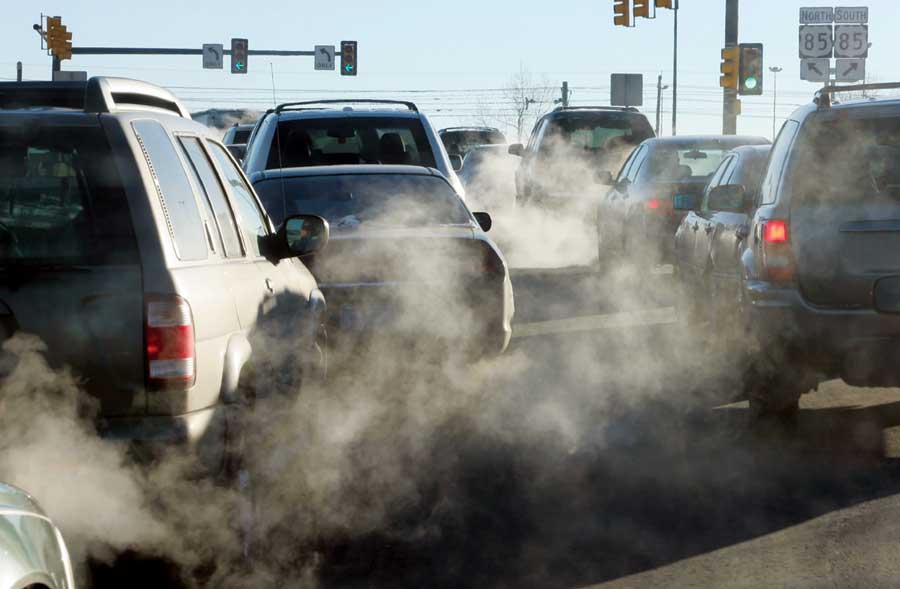11 Dec 2024

Tired Earth
By The Editorial Board

Car pollution has been reduced significantly over the years when efforts were made for countries to switch from leaded gasoline to unleaded fuel. However, this does not mean that car pollution is no longer a problem.
Car pollution is still one of the major causes of pollution today. The pollution that cars contribute to the environment is not limited to the air – cars also pollute the land and water.
Here, we look at the ways cars pollute our environment. In a separate article, we will cover how you and I can help to reduce car pollution, through our choice of cars and fuels, and through everyday driving tips.
Car pollution facts 1 – Impact on the air
It is a commonly known car pollution facts that exhaust gases from cars and other automobiles pollute the air. Indeed, several types of air pollutants are emitted in car exhaust. These pollutants are a result of the incomplete combustion of fuel (hydrocarbons). Some of the major air pollutants found in car exhaust are:
While carbon dioxide in itself is not a harmful gas (it is always present in our air), it is a green house gas, and the build-up of large concentrations carbon dioxide in our planet’s atmosphere have been linked to observed global warming and climate change in the past few decades. And in turn, global warming climate change has brought about much undesired and even devastating consequences on our land and people.
Water vapour - Like carbon dioxide, water vapor in itself is not harmful. In fact, water vapors are basic to the formation of rain and are found in our air normally. However, it becomes a problem when the exhaust pollutants combine with condensed water vapor to form smog.
Besides the above air pollutants, car pollution facts suggest that car exhausts may also contain sulfur dioxide, benzene and formaldehyde, depending on the nature of fuel that is used.
One of the less commonly known car pollution facts is that the fuels in cars also pollute the air through evaporative emission of hydrocarbons into the air. The fuels that cars use are basically hydrocarbons. In turn, the evaporative emission process contributes unburnt hydrocarbons into the atmosphere, and this contribution is on top of the unburnt hydrocarbons released from the fuel combustion process.
If you have been to a fuel refueling station, you probably would have smelt the strong fuel vapors in the air around the station. These hydrocarbon vapors are a result of evaporative emissions from the car fuels in the station tanks. However, these toxic fumes are not only emitted from fuel tanks at the refueling stations. The vapors are also emitted by cars and other automobiles from the vehicles’ fuel tanks, when the vehicles are hot (e.g. when the car is running and the hot engines and exhaust systems vaporize the fuel), when the surrounding temperature rises, and or during refueling of vehicles when fuel vapor found in car fuel tanks are displaced by liquid fuel.
Car pollution facts 2 – Impact on the land
One of the car pollution facts that many overlook is that cars also pollute the land.
Sometimes, this land pollution is direct. For example, the engine oil that leaks from cars to the ground or soil actually pollutes the land.
More often, the pollution to land is indirect (which is why this car pollution facts often go unnoticed).
The acid rain formed from NOx in car exhaust dissolving in rain can lead to soil acidification. Nutrients in soil are leached away and beneficial soil organisms are killed in this soil-acidification process. Eventually, the soil might become barren and incapable of supporting life.
In addition, when cars are scrapped, not all their parts are recycled. Some of the parts that cannot be recycled end up in the landfills. Landfills are in turn a source of land pollution in themselves.
Cars, as well as the roads and car-parks that are needed to accommodate these automobiles, also take up a lot of space. In the process of making space for these vehicles as well as the required transportation infrastructure, vegetated land might have to be cleared. Subsequently, the roads and buildings are constructed. This entire process has a large impact on the ecological balance previously existing in that area.
Car pollution facts 3 – Impact on water
Another one of the car pollution facts is that cars pollute water besides the air and land.
Engine oil and other automobile fluids that leak from cars, as well as dirt, brake dust or particles in car exhaust that settle onto the ground, get washed away by water run-offs during downpours. These water pollutants often then enter our water bodies, including rivers, seas, reservoirs and underground water bodies.
Leaks from underground fuel storage tanks are also a source of water (and land) pollution. And so are the waste fluids from cars (e.g. used engine oil) that are indiscriminately disposed of into drains and rivers.
Source: all-recycling-facts.com
Comment